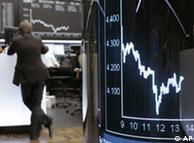FINANCE | 19.05.2010
German market plunges after short selling ban
German markets and the euro currency fell sharply Wednesday morning after German finance regulator BaFin enacted a moratorium late Tuesday night on speculative short selling of European government securities.
The moratorium will last until the end of March next year and is intended to slow speculators from engaging in naked short selling against the sovereign debt of financially troubled countries like Greece.
 A Greek default on debts could endanger the entire European financial system
A Greek default on debts could endanger the entire European financial system
Naked short selling occurs when speculators temporarily sell securities which they hope they can borrow. If the speculator can then obtain the sold security, and it loses value as predicted, it can later be repurchased for less money, generating profit.
BaFin said in a statement the moratorium is justified because of the "extraordinary volatility of European government debt securities."
Credit default swaps also banned
The moratorium also applies to credit default swaps linked to eurozone governments and the naked short selling of the stocks of ten major financial companies.
The ban may slow market fluctuations after the European Union agreed on a 110-billion-euro ($140 billion) bailout for Greece and a 750-billion-euro fund for other countries with teetering finances like Portugal and Spain.
Governments fear that Greek bankruptcy would destabilize the entire European financial system. On Tuesday, Greece received 14.5 billion euros of EU loan support just a day before it needed to pay nine billion euros on a maturing 10-year government bond.
"Massive short selling of affected government debt securities and the closing of unfunded credit default swaps based on the risk of European governments defaulting would have led to further excessive price fluctuations which would significantly disadvantage the financial market and could endanger the stability of the entire financial system," BaFin said in its statement.
gps/AFP/dpa
Editor: Ben Knight


No comments:
Post a Comment